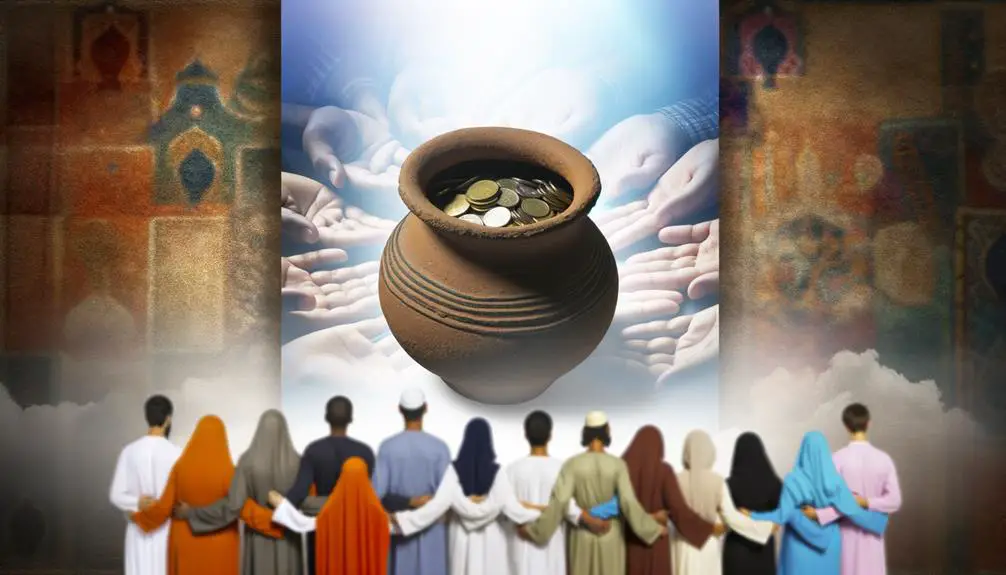Learn about the biblical meaning of being 'ransomed' and its transformative journey from literal freedom to a profound spiritual liberation.

What Does Ransomed Mean in the Bible
Imagine you're exploring an ancient marketplace and stumble upon a scenario where someone is being freed from bondage in exchange for a price; this act closely mirrors the biblical concept of being 'ransomed.'
In the Bible, this term evolves from a literal to a figurative liberation, offering a rich tapestry of redemption and sacrifice. As you've embarked on this journey, you may wonder how such a concept transcends from ancient texts to influence modern spiritual beliefs.
Unpacking the layers of this term will not only enrich your understanding of scriptural narratives but also offer insights into its profound relevance today.
Key Takeaways
- Ransom in the Bible signifies redemption and salvation through sacrificial acts.
- It encompasses both financial and spiritual dimensions, particularly emphasizing Jesus' sacrifice as the ultimate ransom.
- The concept is deeply rooted in Old and New Testament practices, evolving from temporal to spiritual focus.
- Ransom challenges believers to reflect on moral implications, highlighting themes of sacrifice, liberation, and God's love.
Origins of Ransom in Scripture

The concept of ransom, deeply rooted in biblical scripture, originates from ancient practices of compensation or redemption. You'll find that ransom linguistics and cultural comparisons shed light on its multifaceted significance. Historically, the term 'ransom' encapsulates the idea of liberating someone by paying a price, a notion that traverses cultures and epochs. This foundational understanding paves the way for a deeper exploration of its scriptural essence, distinct from the more familiar legal or criminal connotations in contemporary settings.
Ransom linguistics offers a compelling perspective. The linguistic roots in various languages often convey a dual sense of loss and recovery, emphasizing the transactional nature of ransom. This linguistic analysis reveals how cultures perceive the act of ransom not merely as a financial transaction but as a profound moral and spiritual action. It's fascinating to observe how different cultures embed this concept within their linguistic and societal frameworks, thereby enriching our understanding of its biblical interpretation.
Cultural comparisons further illuminate the concept's universality and variability. In some cultures, ransom is closely tied to honor and societal status, whereas in others, it underscores spiritual redemption or liberation. These cultural nuances highlight the complexity of interpreting 'ransomed' within a biblical context. They suggest that its meaning transcends a simple exchange, hinting at deeper layers of spiritual and moral redemption.
As you delve into the origins of ransom in scripture, it becomes clear that understanding its linguistic and cultural dimensions is crucial. This analytical journey not only enriches your comprehension of the term but also opens up a broader vista on its application and resonance across different societies and epochs.
Ransom in the Old Testament

Delving into the Old Testament, you'll find that 'ransom' plays a pivotal role in shaping the narrative of redemption and liberation that unfolds within its texts. This concept is deeply interwoven with the religious and cultural practices of ancient Israel, manifesting primarily through sacrificial offerings and redemption laws. These elements serve not only as a means of atonement but also as a symbol of God's covenant with His people.
To further explore this, consider the following three aspects:
- Sacrificial Offerings: The Old Testament details various types of sacrifices, such as burnt offerings and sin offerings, which were performed to atone for the sins of the people. These sacrifices can be seen as a form of ransom, a price paid to redeem individuals from their transgressions and restore their relationship with God.
- Redemption Laws: The Law, particularly as outlined in Leviticus and Deuteronomy, includes specific redemption laws. These laws allowed for the redemption of land, property, and even individuals who'd sold themselves into servitude due to debt. The ransom in these cases was a tangible expression of God's desire for the freedom and restoration of His people.
- The Passover: Arguably the most poignant example of ransom in the Old Testament is the Passover. The blood of the lamb, painted on the doorposts of Israelite homes, served as a ransom that spared their firstborn from the final plague in Egypt, leading to their liberation.
Through these examples, it's clear that ransom in the Old Testament is multifaceted, embodying themes of sacrifice, redemption, and liberation that are central to the narrative of the Bible.
The Transition to the New Testament

As we move from the Old Testament to the New Testament, it becomes evident that the concept of ransom undergoes a significant evolution, reflecting a deeper theological understanding of redemption and salvation. This transition isn't merely a shift in narrative but a profound expansion of the ransom motif, intricately woven with the fulfillment of Messianic prophecies and the groundbreaking notion of Gentile inclusion.
In the Old Testament, ransom primarily pertains to the liberation of Israelites from physical bondage or socio-economic distress. However, in the New Testament, this concept is radically transformed to address a universal human condition—sin and spiritual estrangement from God. The Messianic prophecies, which foretell the coming of a Savior to redeem God's people, find their fulfillment in the New Testament narrative. This fulfillment isn't limited to the physical descendants of Abraham but extends to all humanity, signaling a pivotal shift towards inclusivity.
The inclusion of Gentiles in the redemptive plan signifies a major theological advancement. It underscores the universality of God's grace and the expansive scope of salvation, extending beyond the confines of ethnic Israel to embrace the whole world. This broader conception of ransom, predicated on the sacrificial love and mercy of God, sets the stage for a new covenant that transcends the limitations of the old.
Analyzing this transition reveals how the New Testament reinterprets and enriches the concept of ransom. It moves from a temporal, material focus to a spiritual, eternal perspective, underscoring the comprehensive nature of God's redemptive work through Christ, anticipated by the prophets and unveiled in the Gospel narrative.
Jesus as the Ultimate Ransom

In exploring the New Testament, we find Jesus Christ epitomized as the ultimate ransom, fundamentally redefining the concept of redemption for humanity. This divine sacrifice, unparalleled in its breadth and depth, marks a pivotal moment in the redemption process, offering salvation to all who believe.
To fully appreciate the magnitude of Jesus' role as the ultimate ransom, consider the following aspects:
- Fulfillment of Prophecy: Jesus' divine sacrifice was foretold by prophets, establishing Him as the preordained savior whose death would reconcile humanity with God. This fulfillment of prophecy underscores the meticulous planning involved in the redemption process.
- Substitutionary Atonement: Jesus' death on the cross served as a substitution for the penalties of sin that were due to humanity. By willingly taking upon Himself the sins of the world, He offered a pathway to redemption that was previously inaccessible.
- Eternal Impact: The effects of Jesus' sacrifice extend beyond temporal salvation. They offer an eternal reconciliation with God, illustrating the profound depth of the redemption process. This eternal perspective shifts the understanding of redemption from a temporary reprieve to a permanent restoration of the relationship between humanity and the divine.
In examining these elements, it becomes clear that Jesus' role as the ultimate ransom is central to Christian theology. His divine sacrifice not only fulfills ancient prophecies but also initiates a comprehensive redemption process that offers hope and salvation to all of humanity. This scholarly examination reveals the layers of meaning behind Jesus' act of redemption, emphasizing its significance in the broader narrative of the Bible.
Theological Implications of Ransom

The concept of ransom in theological discourse invites a nuanced exploration of its implications on Christian doctrine and believer's lives. You're introduced to a realm where moral paradoxes and redemption ethics intersect, offering a profound understanding of salvation and its cost. This concept underscores the transformative power of Christ's sacrifice, emphasizing the liberation from sin at a price, which in turn, raises significant questions about the nature of freedom and obligation in the Christian faith.
Delving deeper, you encounter the moral paradoxes inherent in the idea of ransom. It's a concept that juxtaposes the unconditional love of God with the necessity of a sacrificial payment. This duality challenges you to consider the ethical implications of redemption. How does one reconcile the free gift of salvation with the costly act of sacrifice? It's a question that invites you to reflect on the depth of God's investment in humanity and the ethical response it demands from believers.
Furthermore, the ethics of redemption as portrayed through ransom sheds light on the responsibilities of the redeemed. You're called to live in a manner that reflects the price paid for your freedom. This aspect of ransom doesn't only pertain to individual morality but extends to social justice and community living. It prompts a reevaluation of how love, sacrifice, and freedom inform your interactions and contributions to society.
In essence, the theological implications of ransom in the Bible challenge you to grapple with complex moral and ethical questions, deepening your understanding of Christian doctrine and its application in your life.
Ransom's Role in Modern Faith

You must consider how the concept of ransom resonates within modern faith, particularly its spiritual significance and practical application in life.
This exploration requires you to evaluate the ways in which this ancient concept is interpreted and lived out by believers today.
It's crucial to understand not only the historical and theological roots of ransom but also how its principles are integrated into contemporary spiritual practices.
Ransom's Spiritual Significance
Understanding the concept of ransom within modern faith reveals its profound impact on spiritual beliefs and practices. The notion of ransom, deeply embedded in scriptural texts, plays a significant role in shaping contemporary religious identity and devotion. It's intertwined with the:
- Freedom concept: Ransom symbolizes the liberation from spiritual bondage, offering believers a pathway to salvation and eternal life.
- Sacrifice value: It underscores the importance of self-giving and altruism within communities of faith, reflecting the ultimate sacrifice made for humanity's redemption.
- Personal transformation: The idea encourages individuals to reflect on their spiritual journey, fostering a deeper understanding and commitment to their faith.
Analyzing ransom's spiritual significance thus offers insights into its enduring influence on modern religious thought and practice, highlighting its role in promoting spiritual freedom and moral values.
Applying Ransom in Life
In modern faith, applying the concept of ransom goes beyond scriptural narratives, directly influencing how believers engage with their spiritual practices and ethical responsibilities.
You're encouraged to embody personal forgiveness as a reflection of the ultimate ransom paid. This act isn't merely about absolving others' wrongs but also about liberating oneself from the chains of bitterness and resentment.
Similarly, community service becomes an extension of this concept, where you contribute to the redemption of societal ills. By actively participating in acts of kindness and support, you're essentially paying forward the ransom received.
This holistic approach ensures that the principle of ransom isn't confined to ancient texts but is a living, breathing aspect of your faith journey, fostering a more compassionate and empathetic community.
Frequently Asked Questions
How Has the Concept of Ransom Influenced Christian Practices and Sacraments, Such as Baptism and Communion?
In Christian practices, like baptism and communion, ransom metaphors deeply influence your understanding of sacrifice and redemption. These rituals symbolize your purification and commitment, mirroring sacrificial parallels seen in Jesus's death, considered the ultimate ransom for humanity's sins.
This conceptual framework shapes how you perceive your relationship with the divine, emphasizing a transactional yet profoundly spiritual exchange — your faith and devotion in return for salvation and eternal life.
Are There Any Notable Differences in the Interpretation of Ransom Between Different Christian Denominations or Other Religions?
Yes, there are notable differences in how ransom symbolism is interpreted across various Christian denominations and other religions. Denominational perspectives vary significantly, with some emphasizing a literal transactional aspect, while others focus on the metaphorical or spiritual implications.
These interpretations impact theological doctrines and practices, illustrating the diversity within Christianity and between it and other faiths. Understanding these differences requires a deep dive into the theological underpinnings of each perspective.
How Do Contemporary Theologians Reconcile the Concept of Ransom With Modern Understandings of Justice and Redemption?
You're exploring how theologians today merge the concept of ransom with contemporary views on justice and redemption. They delve into modern ethics and psychological healing to provide a fresh perspective.
This approach helps reconcile traditional religious teachings with current societal values, ensuring that the notion of ransom remains relevant.
In What Ways Has the Concept of Ransom Been Depicted or Utilized in Christian Art and Literature Throughout History?
Throughout history, you've seen ransom symbolism richly woven into Christian art and literature, painting a vivid tapestry of redemption.
Artistic interpretations often depict scenes of sacrifice and liberation, offering a multifaceted view on the concept of ransom.
These depictions serve as a bridge, connecting theological ideals with the tangible, and inviting a deeper contemplation on themes of salvation.
This imagery doesn't just adorn; it invites you into a reflective journey through faith's core narratives.
Can the Concept of Ransom Be Applied to Personal Spiritual Growth or Is It Strictly a Theological Construct Meant for Understanding Salvation History?
You might wonder if the concept of ransom strictly pertains to theological discussions or if it can influence your personal spiritual journey. It's not just about salvation history; it's deeply relevant to your path.
This idea fosters personal transformation and spiritual resilience. By seeing yourself as part of a larger redemption narrative, you can find motivation and direction in your faith, using it as a catalyst for growth and inner change.
Conclusion
In conclusion, the concept of ransom in the Bible transitions from a tangible price for liberation in the Old Testament to a profound, spiritual liberation through Jesus in the New Testament.
Intriguingly, a Pew Research Center study reveals that 72% of Christians view Jesus's death as essential to their faith, highlighting the enduring significance of the ultimate ransom.
This theological evolution underscores the depth of ransom's role, transforming it from a historical practice to a cornerstone of modern Christian belief.



Sign up